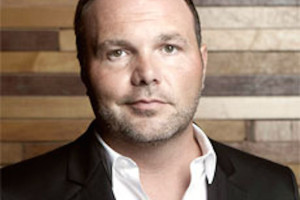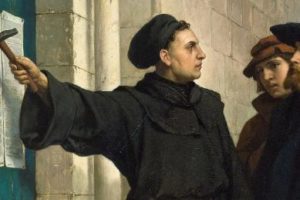It is hugely disappointing to me that I still have to defend my love for the Harry Potter series to other Christians. In good Two Cities fashion of “reconciling Evangelicals with the ‘Bad Guys,’” I will give two reasons why the Harry Potter series is not a threat to the Christian worldview and is actually a good means of teaching Christian moral values to children and adults.
Harry & Stoicism
The Harry Potter series is a helpful resource in creating a thought experiment for teaching good actions according to stoic philosophy. Humanist and reformed Christians have been assimilating the Stoics’ moral thought for centuries. They have used the basic elements of stoicism; invoking a God that is transcendent, all-powerful, and caring. They encourage believers to recognize the influence of God’s providence without abandoning the task of conforming their own wills to it. We can still see elements of this philosophy in Augustine, Boethius, Calvin, and Kant.
Harry often finds himself using his own free will in a seemingly predetermined world. This is a very stoic conception of free will. Harry cannot help the situations he is in. He was born into this world without his consent and is without question a victim of fate. Even though Harry finds himself born into such an undesirable life he still works with the regulations he has been given and brings his emotions under control. He is able to use his talents and skills to do what is right in any given situation. Harry exercises his free will in situations that are beyond his control and shapes his life within the confines of what has been given to him. He cannot see the outcome of the situations that he is in and he takes good courses of action.
Harry and the Stoics emphasize active free choice rather than passive acceptance of the surrounding world. Harry has become used to evil in his world and yet he remains true to what is right even if the end result is painful. He continues to remain constant, which is a trait of Stoics throughout history. Dumbdledore, a true stoic moralist, tells Harry that it is his choices that show who we truly are more than our abilities.
Harry, Hermione, and Ron often find themselves in situations that result in the need to use reason and self-discipline even if their decisions come with much risk and at the sacrifice of something dear to them. These three young students each show self-discipline in the service of the larger good recognizing that this is the only way to secure victory and the safety of those whom they love. Though a strict definition of good and evil is never given in the books, our protagonists always use reason to discern the right action.
Authority and Civil Disobedience
Another common objection to the book series is that Harry disobeys authority and encourages others to do the same. It is important to consider under what circumstances Harry does disobey authority in the books.
The most notable disobedience of authority is in the fifth book, Order of the Phoenix, when a Ministry official named Delores Umbridge is sent to teach at the school in order to prevent the students from learning any magic to defend themselves against Voldemort. Umbridge over the course of the year becomes a tyrannical leader creating rules to serve her own purposes of getting in good with the Minister of Magic. Harry is at this point very experienced in defending himself against the dark arts and begins a secret class against the wishes of the Ministry in order to teach other students how to defend themselves.
This kind of civil disobedience is not a new topic amongst political philosophers. For centuries great minds have been asking the question, under what occasions and circumstances should one resist governing authorities, and how should it look? John Locke did much thinking in this particular area as the England that he was living in during the 17th century was polluted with political leaders persecuting those who had different views from their own.
For Locke, tyranny is the exercise of power without right. Power must always be used for the common good, if power is used for the private ends of whoever is ruling then they are tyrannical. When law ends tyranny begins. A leader may exercise prerogative power if the ends of his decisions are for the general good. Locke was concerned with whether resisting the government can be right and moral. He asked under what circumstances would resisting be acceptable?
Locke gives some examples of occasions when it is right to resist authority. (1) When the government acts on their own, putting their own arbitrary will above the laws that the society has set up. (2) When an individual ruler keeps the people from assembling. (3) When the arbitrary power of the ruler changes the way in which an election takes place without consent and is against the interests of the people. (4) The government is dissolved from within when the powers are contrary to the trust of the people. (5) The government acts against this trust when it seeks to invade people’s property and tries to take peoples lives, liberties, and fortunes. (6) A breach of trust is committed when a state of war is declared on the people. According to Locke, people at this point may resume their original liberties and establish a new legislative body as they see fit in the place of the tyrannical one. This is so they can be assured of their safety, which is the purpose of a society.
Umbridge breaks all of these occasions that Locke addresses above. She puts her arbitrary will above the students and takes away the students right of assembly. She also receives power from the corrupt ministry to usurp the means in which power is obtained at Hogwarts while confiscating liberties of the students that would be used to help them defend themselves. It is safe to say that a state of war was in fact declared on the students and their safety. According to Locke, Harry is within his moral right to resist the tyrannical rule of Umbridge and set up his own society in order to protect the interests of those he loves and cares for in his community. Thus, accusations that the Harry Potter series teaches people to disobey authority is in fact correct, but under completely moral circumstances that are in agreement with many of the greatest political philosophers who grapple with this issue.
Conclusion
The above examples are just some of the ways that the Harry Potter book series can help think through hard theological and philosophical issues. A really great book that looks at the HP series from a more literary and Christian perspective is called Looking for God in Harry Potter, by John Granger. Though I have not read this book myself, I have heard nothing but great things about it.
The point I am trying to drive home is that Christian parents and educators who are invested in their kids’ lives and educations have no need to worry about Harry Potter being a bad influence. These stories can be good thought-experiments to show how to assess and execute moral decisions in everyday life. If properly directed, children can learn to do the right things in hard situations and bad circumstances from Harry and his friends. Even an astute adult observer who engages with the problems of the books can walk away with a better knowledge of how to persevere through hardship, sacrifice for loved ones, and have appropriate empathy to friends in pain. These books are not only wonderfully entertaining, but fiercely educational.
Nathaniel Warne is currently a Ph.D. candidate at Durham University U.K. where he is studying theological ethics and political philosophy. He is currently studying under Christopher J. Insole and Alec Ryrie. Nathaniel received a B.S. in Art (Painting and drawing) and minored in Biblical Studies at Biola University. After receiving his undergraduate degree, Nathaniel spent three years as a professional session drummer. He then received an M.A. from Talbot School of Theology in moral and historical theology. He wrote his masters thesis on 16th century Geneva and its political influence of John Locke. Nathaniel was also a minister at Grace Evangelical Free Church, La Mirada before moving to Durham. He has been married to his beautiful wife Charissa for five years. Nathaniel’s primary academic interests: theological ethics, political philosophy, intersection of metaphysics with ethics, especially with regard to haecceity and modality, Puritan’s doctrine of calling, theology of work, history of natural law, Aristotle, and Søren Kierkegaard. He also enjoys reading: John Locke, Karl Barth, Philosophy of Aesthetics, and Literature of all sorts. Some hobbies of Nathaniel’s are playing and listening to music (jazz, folk, rock, hip-hop), cooking, foreign and domestic beers, and watching Fringe, 30 Rock, Big Bang Theory, and Cosby Show with his wife.
Nathaniel can be reached at: n.a.warne at durham.ac.uk





10 Comments
Leave your reply.